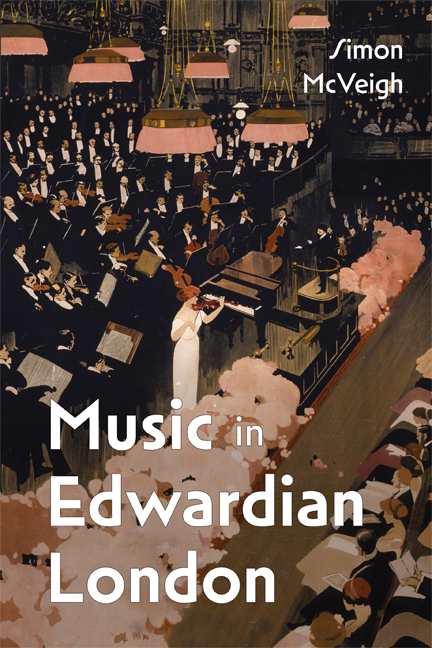Book contents
- Frontmatter
- Dedication
- Contents
- List of Illustrations
- Preface
- 1 Edwardian Soundscapes
- 2 Mapping a Musical City: Place (and Class)
- 3 Mapping a Musical City: Time (and Taste)
- 4 London as Musical Hub: Europe, America, Empire
- 5 The British Question
- 6 Britain and ‘Others’
- 7 Hidden Voices
- 8 From Battersea to Bermondsey: Suburban Music and Local Politics
- 9 London’s Music: An Overview
- Sources and Bibliography
- Index
- Miscellaneous Endmatter
5 - The British Question
Published online by Cambridge University Press: 09 May 2024
- Frontmatter
- Dedication
- Contents
- List of Illustrations
- Preface
- 1 Edwardian Soundscapes
- 2 Mapping a Musical City: Place (and Class)
- 3 Mapping a Musical City: Time (and Taste)
- 4 London as Musical Hub: Europe, America, Empire
- 5 The British Question
- 6 Britain and ‘Others’
- 7 Hidden Voices
- 8 From Battersea to Bermondsey: Suburban Music and Local Politics
- 9 London’s Music: An Overview
- Sources and Bibliography
- Index
- Miscellaneous Endmatter
Summary
IN HIS BIOGRAPHY OF Havergal Brian, tellingly entitled Ordeal by Music, Reginald Nettel rehearses the frustrations of a working-class hopeful moving to London from rural Staffordshire. First he wrote sunnily to Bantock: ‘I am asking “B. and H.” to send copies of the songs and scores to all the critics of the London Press. After they have been out three days I intend to make appointments with the lot.’ He tried Parry, Vaughan Williams, Elgar and others: but only three of the critics replied, and not a single review – let alone a performance – resulted. Humiliated, furious, and convinced that London publishers were only interested in ‘church pot-boilers’, he abandoned the quest after a few months and headed back north.
It's an affecting tale, though not quite the whole story. Despite lacking London connections, Brian had previously enjoyed some success, with performances by Wood and Beecham – he had even been generously bankrolled by a wealthy Staffordshire businessman. A series of personal crises precipitated his renewed assault on London, but he also failed miserably to capitalise on his early breaks.
Brian's career encapsulates many of the themes of this chapter: the vicissitudes experienced by the aspiring composer, particularly a working-class provincial with no London base; and the crucial roles played by forward-looking conductors, rich sponsors – and grasping publishers. Above all, it raises the question of the capital. Was London the solution – or part of the problem?
❧ A national musical culture
Current views of British music of the period tend to lean towards one of two opposing poles. From one perspective, it was a triumphant celebration of victory over adversity (the English Musical Renaissance, the Royal College of Music, Elgar and Edwardian imperialism, Wood and the Proms, the rise of Beecham). Alternatively, it represents a sorry rollcall of social oppression and dismal philistinism, as reflected in the railings of the disaffected and in the bitter and forlorn campaigns for government funding, in response to years of neglect.
Reality, as usual, was more nuanced. New British voices were never truly restricted to those few prominent venues – such as the Proms – which partial histories tend to overemphasise.
- Type
- Chapter
- Information
- Music in Edwardian London , pp. 137 - 183Publisher: Boydell & BrewerPrint publication year: 2024

